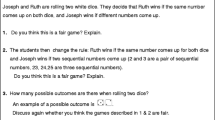Abstract
The process of transition from a novice's state to that of an expert, in the constrained domain of decimals, is described in terms of explicit, intermediate, and transitional rules which are consistent, yet erroneous. These rules can be traced to former rules already established in earlier knowledge domains. Empirical data from children at grades 6, 7, 8 and 9 will demonstrate the evolution of an expert's knowledge through an elaborated learning path.
Similar content being viewed by others
References
ChiM. T. H., GlaserR., and ReesE.: 1981a, ‘Expertise in problem solving’, to appear in R.Sternberg (ed.), Advances in the Psychology of Human Intelligence, Erlbaum, Hillsdale, N.J.
Chi, M. T. H., Feltovich, P., and Glaser, R.: 1981b, ‘Categorization and representation of physics problems’, in J. Anderson (ed.), Cognitive Skills and Their Acquisition, Erlbaum,
Hoz, R. and Gorodetsky, M.: 1983, ‘Cognitive processes in reading and comparing pure and metric decimal rational numbers’, Draft, Ben-Gurion University.
Kidron, I. and Vinner, S.: 1983, ‘Rational numbers and decimals at the senior high level — density and comparison’, in Proceedings of the Seventh International Conference for the Psychology of Mathematics Education, pp. 301–306.
LarkinJ. H.: 1981, ‘Enriching formal knowledge: A model for learning to solve textbook physics problems’, in J.Anderson (ed.), Cognitive Skills and Their Acquisition, Erlbaum, Hillsdale, N.J.
LeonardF., and Sackur-GrisvaldC.: 1981, ‘Sur deux regles implicites utilisees dans la comparaison des nombres decimaux positifs’, Bulletin de l'APMEP 327 47–60.
Nesher, P. and Peled, I.: 1984, ‘The derivation of mal-rules in the process of learning’, Draft, The University of Haifa, 1984 (Hebrew).
Resnick, L. B.: 1982, ‘Beyond error analysis: the role of understanding in elementary school arithmetic’, John Wilson Memorial Lecture presented at the Annual Meeting of the Research Council for Diagnostic and Prescriptive Mathematics, Buffalo, New York.
Resnick, L. B. and Nesher, P.: 1983, ‘Learning complex concepts: The case of decimal fractions’, Paper presented at the Twenty-Fourth Annual Meeting of the Psychonomics Society, San Diego, California.
SieglerR.: 1978, ‘The origins of scientific reasoning’, in R.Siegler (ed.), Children's Thinking: What Develops, Erlbaum, Hillside, N.J.
SimonD. P. and SimonH. A.: 1978, ‘Individual differences in solving physics problems’, in R.Siegler (ed.), Children's Thinking: What Develops, Erlbaum, Hillsdale, N.J.
SwanM.: 1983, The Meaning and Use of Decimals, Shell Centre for Mathematical Education, Nottingham University, U.K.
Author information
Authors and Affiliations
Rights and permissions
About this article
Cite this article
Nesher, P., Peled, I. Shifts in reasoning. Educ Stud Math 17, 67–79 (1986). https://doi.org/10.1007/BF00302379
Issue Date:
DOI: https://doi.org/10.1007/BF00302379




